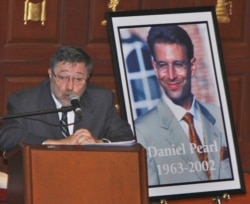A Pakistani court Thursday overturned on appeal the death sentence of a man accused of kidnapping and beheading Wall Street Journal reporter Daniel Pearl, sentencing him to seven years in prison for kidnapping only, and acquitted three of his co-accused.
British-born Ahmed Omer Saeed Sheikh had been on death row since his conviction 18 years ago. Three others, Fahad Naseem, Salman Saqib, and Sheikh Adil, were serving life sentences.
The prosecution could appeal the verdict in the Supreme Court.
Defense attorney Khwaja Naveed Ahmed told VOA Sheikh was not even charged with murder at the time of his arrest in 2002, before news of Pearl’s murder became public. He was only charged with kidnapping and handing Pearl over to someone else. The charge of murder was added once a video of Pearl’s beheading surfaced, he said.
“The prosecution’s story was that Sheikh became friends with Pearl because he could speak French and had graduated from the London School of Economics,” Ahmed said, adding that after today’s verdict he is expected to be released in a day or two.
Pearl, the newspaper’s South Asia bureau chief, was kidnapped while investigating religious extremists in Karachi. His beheading made headlines around the world and the international outcry forced Pakistan to take swift action against the perpetrators.
Later, a detailed report issued by a Georgetown University investigative journalism project called the Pearl Project, claimed Pearl had been beheaded by al-Qaida’s Khalid Sheikh Mohammed, the mastermind of the Sept. 11, 2001, attacks on the United States.
Ruling condemned
Thursday’s ruling drew denunciation from global and domestic groups campaigning for the rights and security of journalists.
The U.S.-based Committee to Protect Journalists (CPJ) said it was “deeply disappointed” to see that the Pakistani court denied justice in the murder case of the WSJ reporter.
“We urge prosecutors to appeal the decision, which found Ahmed Omar Saeed Sheikh guilty only of kidnapping Pearl in a crime that led directly to his murder,” said Steven Butler, CPJ’s Asia program coordinator.
Reporters Without Borders (RSF) condemned the ruling as a “shocking symbol of impunity” for violent crimes against journalists and an “incoherent” decision.
Daniel Bastard, the head of RSF’s Asia-Pacific desk, noted that the court order recognizes Sheikh’s guilt while in effect overturning his conviction.
“This is a shocking denial of justice for Daniel Pearl’s family and will stand as a symbol of impunity for crimes of violence against journalists in Pakistan,” Daniel said.
Pakistan Federal Union of Journalists (PFUJ) in a statement showed its concern over the reduction in Sheikh’s sentence, saying it will a “bring bad name” for the country.
It demanded the court review its decision and asked the government to immediately file an appeal against it in the Supreme Court “so that the culprits be brought to justice.”
Pearl’s story was later turned into a Hollywood movie starring actress Angelina Jolie as his wife, Mariane Pearl.





